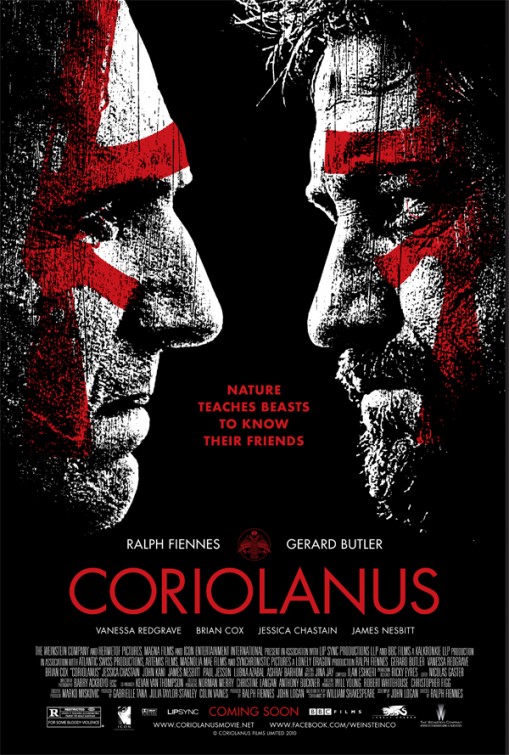Nature Teaches Beasts To Know Their Friends
Director
Ralph Fiennes
Starring
Ralph Fiennes
Gerard Butler
Brian Cox
Vanessa Redgrave
James Nesbitt
There’s a lot to be said for contemporary adaptations of Shakespeare. Granted off-stage they’re almost always a complete flop and due to antiquated dialect and prejudices, finding an audience can be particularly brutal. Even if a popular one is made it’s almost impossible to critique owing to the classic retort of “you didn’t appreciate it because you have no culture.” Thankfully, for me at least, I thoroughly enjoyed Coriolanus, so there’s no such worry for me. Oh, and as an additional side note: I am, somewhat, a rather pretentious snob, so please take that into consideration when reading the following.
Despite the play’s setting of ancient Rome, the opening news reports and title cards explain that the derelict, almost Soviet looking tower blocks are Fiennes’ contemporary equivalent. From inside the rundown houses, the poor are starving and rally to march on the grain mill. Upon arrival they storm the gates and are instantly confronted by the military/police and Caius Martius [Fiennes] himself. Martius is a soldier, through-and-through, without the gift of silver tongued oratory. As such, his only response is to disperse the rabble, denying them bread which has been reserved for the army, for those who serve Rome. Shortly after this, Tullus Aufidius [Butler], the leader of the Volscian army, executes a Roman and as was customary, the Romans instantly retaliate. After storming the city of Corioles, Martius pursues the insurgents alone, ending in a face-to-face knife fight with Aufidius. The Volscians are forced to retreat and Martius is welcomed home a proud victor and awarded the cognomen Coriolanus. Furthermore, for his actions he is persuaded to accept the role of consul. After much debate he eventually accepts this role but through the words of Brutus [Paul Jesson] and Sicinius [Nesbitt], the people turn on Martius and he is banished. After wandering the wilderness, Martius finds himself in Antium and forges an alliance with Aufidius to seek vengeance on Rome.
The directorial style jumps from claustrophobic handheld shots, smothering the screen with snarling faces to long static shots as heartfelt speeches are rolled off with poise and (often) venom. In actual fact, the camera rarely pans back and Fiennes has insisted on a very aggressive, close-quarters approach. I imagine this will be a point of great contention for some people, namely because it can often be stifling, suffocating and a little much to really absorb. Having said that, certain monologues are cut and interspersed with transitionary developments and so much more is said in silence than with eloquent soliloquies. Of course, all this is possible solely due to the presence of exceptionally strong performances – both lead and supporting. Unlike many adaptations of this nature, Fiennes has surrounded himself with immense talent and some very interesting choices for his secondary cast – all of which pays off, in my eyes. From the editing to the casting, everything about this film is an attack on presuppositions of Shakespearean plays. The cinematography is gritty, the score rife with guttural tension, the malevolence is ever present and antiquated methods of delivering news or speaking to the audience have been replaced with our own contemporary answer (namely television). Through its method and style, Coriolanus strives to bring Shakespeare to the Call Of Duty generation – as if to goad them by saying, we have blood and violence and conflict and betrayal all here.. and furthermore, it’s Shakespeare.
Naturally, it’s not without fault and there are a few elements that niggled at me. First off, the heightened performances and moments of extreme passion quickly veer into hammy territory. Even without a knowledge of the Harry Potter series, it’s desperately hard not to re-edit the film in your head, depicting Coriolanus screaming and spitting all over a terrified looking Daniel Radcliffe before shooting him in the face. It shouldn’t even be a factor but if I can’t help shake it, I doubt your average cinemagoer is going to resist the opportunity to repeatedly rasp “Harry Potter” to themselves. Then there’s that horrific final shot that I didn’t overly care for.. almost ruined it. I have no intention of spoiling the story – it’s Shakespeare, so you should be able to guess the ending – but the last shot felt wholly unnecessary and a bit of a thumbing to Olivier’s dramatic close to his performance of Coriolanus in the late fifties (don’t quote me on that, I’m a film critic not a theatre aficionado). Outside of that, I felt the whole film was spectacular, stunning, gripping, visceral and bloody entertaining.
Release Date:
20th January 2012
The Scene To Look Out For:
There are two moments in particular I would like to expand on. The first follows Martius’ debate with the public (in this case on live television) and having bitten his tongue for so long he finally snaps, vehemently spewing insults at the commoners for their insolence and ignorant treatment of him. I think I enjoyed it partly because it’s a phenomenally powerful monologue delivered extremely well (albeit with overwhelming gusto) but also because I kind of agree with the man. He speaks his mind and the people are flippant flip-flopping scum who are too easily swayed by carefully placed words. Secondly, having been accepted into Aufidius’ group, Martius’ presence begins to undermine the Volscian general and soon his men are shaving their beards and hair to emulate their newly appointed general. It’s a simple development but having the barber’s chair symbolically painted gold, while the soldiers drink and dance around it in hypnotic worship of Martius, as if it were a throne was a nice touch.
Notable Characters:
Without question, everyone performs magnificently but the two standout figures are notably Ralph Fiennes (for obvious reasons) and Vanessa Redgrave as Martius’ mother. Redgrave offers us passion, manipulation, despair, spite, patience and pride – all of which we have come to expect from matriarchal Roman titans. For someone who has been on the fringe for quite some time now, it’s nice to be reminded of how stunning an actress she can be.
Highlighted Quote:
“Like an eagle in a dove cote I fluttered your Volscians in Corioles. Alone I did it, boy!”
In A Few Words:
“Olivier made Shakespeare intelligible; Fiennes has made it more so, translated through contemporary culture. Simply astounding”
Total Score: 5/5
![The Red Right Hand Movie Reviews [Matthew Stogdon]](https://reviews.theredrighthand.co.uk/wp-content/uploads/2021/12/cropped-header1.png)




